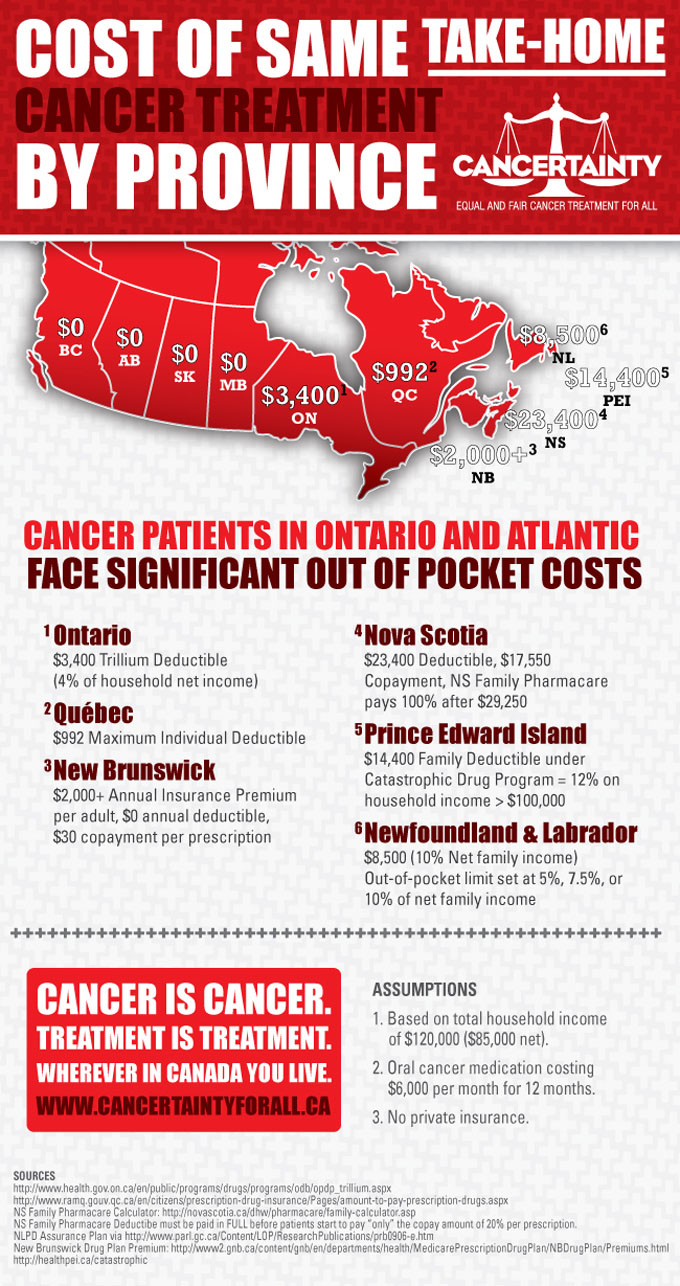WATCH ABOVE: A preview for 16×9’s “Cost of Cancer”

TORONTO – There is the cancer Pierette Breton is fighting, and then there is the fear of insurmountable medical bills to cover her treatment.
In October 2009, Breton was diagnosed with a neuroendocrine tumour in her pancreas. It metastasized into her liver and bones. A single drug helped her fight the cancer – but at a hefty $8,000 a month.
For a few months, her company’s insurance provider covered the bill. After that, insurance brokers warned Breton that her company’s premiums would have to take a steep climb. She was already taking sick leave from work, and paying thousands of dollars for her medication each month wasn’t plausible.
“It was a nightmare for me. It’s way too stressful, some days you can barely cope with going out the door,” Breton told Global News.
Unfortunately, Breton’s story isn’t abnormal for Canadians battling cancer.
Your cancer treatment could determine your financial future
The fate of some Canadians – in health and in medical coverage – is ultimately determined by the drugs that’ll hopefully save them. If they’re handed a treatment plan with oral medication instead of therapy delivered via IV in hospital, patients may have to pay out of pocket for their care depending on where they live in Canada.
READ MORE: Canadian patients struggle to finance cancer treatment
Deborah Maskens has seen it all: a patient in PEI who had to remortgage his home to free up some cash. Couples in Nova Scotia who cashed in their retirement savings for the drug that could save a life. Families in Ontario who max out credit cards to buy more treatments.
What’s worse is she’s seen some patients who decide that they won’t bankrupt their families. Instead, they decline treatment altogether.
“If you’re a cancer patient under age 65 on oral drugs, you’re paying your mortgage, your bills and now you have to pay for cancer drugs. The patient next door who needs an IV doesn’t pay a thing regardless of age or income and can get started within two weeks,” Maskens explained.
“You can’t discriminate one cancer patient from another,” she said.
Maskens has advanced kidney cancer, but her oral medications have turned the disease into a chronic condition. She knows her situation is a rarity: she has full coverage for her current medication.
She’s the founder of Kidney Cancer Canada – after putting together the organization, she spearheaded a project called CanCertainty, a campaign that calls for fair and equal access to cancer medications. So far, 35 Canadian cancer organizations have joined the cause.
READ MORE: Canada losing out on negotiating lower drug prices, study says
Right now, what Canadians have to pay for cancer drugs taken orally varies across the country. In Western Canada, it doesn’t matter how the drugs are getting into your system, patients don’t face the burden of paying up or waiting for coverage.
“Not only will you pay zero dollars, but you leave the oncologist’s office and go down the hall to pick up your pills and go home,” Maskens explained.
In Ontario and Atlantic Canada, coverage is spotty, a maze of deductibles and patchwork solutions based on your household income, your private insurance (if any), and your provincial pharmacare plan. And patients often wait six to eight anxious weeks while all of this gets sorted out.
Striving for improvements
Once you’re diagnosed with cancer, an oncology team creates your treatment plan based on the best medications that are approved in Canada to fight your specific disease. The type of treatment depends on the type of cancer, the stage, and provincial guidelines, according to Lauren Dobson-Hughes, senior manager of public issues at the Canadian Cancer Society.
For many types of cancer, oral cancer drugs are becoming increasingly common – about 60 per cent of therapies are take-home options, typically pills or self-injectables. For some patients, it offers them freedom from lengthy stays in hospital and comfort in their own homes.
But unless you have private insurance from your employer or public insurance through your province, you’re on the hook for the bill. The average price for a month of oral cancer medication is about $6,000 – and treatment can be for a year or longer.
READ MORE: Why critics say the EU trade deal will drive up Canada’s drug prices
While Maskens and CanCertainty have been pushing provinces for change, the Canadian Cancer Society has been appealing to the federal government to standardize coverage.
“We all have our roles to play in governments increasing what they cover and who they cover so they reduce financial burden, in companies to justify why they charge what they charge and organizations like ours to stand up for cancer patients,” she said.
To learn more about oral cancer drug coverage in Canada, watch 16×9 Saturday at 7 pm.
carmen.chai@globalnews.ca
Follow @Carmen_Chai





Comments